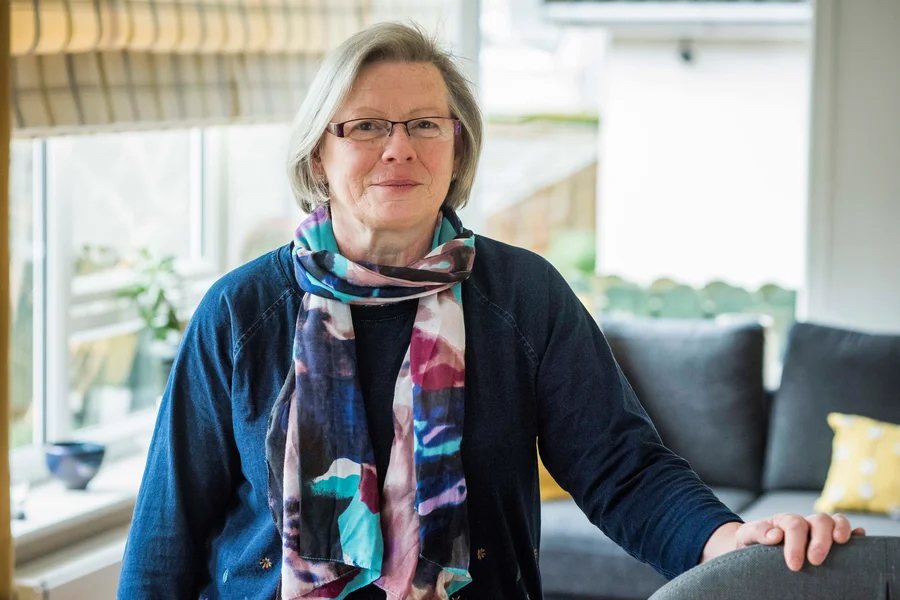"I thought she must be smelling old people and associating that with Parkinson's symptoms," Barran, of the University of Manchester, England, recalled.
The woman in question is Joy Milne, 74, a retired nurse. Years ago, she noticed a strange musky odor emanating from her husband. Thirteen years later, he was diagnosed with Parkinson's disease. At a Parkinson's support group meeting, Milne realized that all the patients shared the same musky scent.
 |
Joy Milne has a "superhuman sense of smell" with the ability to detect the scent of Parkinson's disease. Photo: Npr |
Joy Milne has a "superhuman sense of smell" with the ability to detect the scent of Parkinson's disease. Photo: Npr
Intrigued, Barran's team decided to test Milne's ability. They gave her 12 t-shirts to smell: six worn by people with Parkinson's and six by healthy individuals. Milne correctly identified all six Parkinson's patients. She even singled out one person who had not yet been diagnosed, and less than a year later, that individual did indeed develop Parkinson's.
"It was extraordinary," Barran said, "just like how she recognized it in her husband, she was diagnosing before the clinicians."
In 2015, Milne's remarkable ability was reported in newspapers worldwide. Thanks to her, scientists are now working to systematize the detection of these bio-odor markers to accelerate diagnosis for a range of diseases, from Parkinson's and brain injuries to cancer. The key may lie in our sense of smell.
"The thing that drives me crazy is the signal is already there, dogs can smell it, and we’re still sticking needles in people’s butts to test for prostate cancer," said physicist Andreas Mershin, co-founder of RealNose.ai, a company pioneering machine olfaction combined with artificial intelligence.
RealNose.ai is developing a "machine nose" capable of diagnosing diseases based on their smell. This technology is crucial because few people can detect the biochemicals present in the early stages of illness.
Experts say some diseases have such strong odors that even the average person can recognize them. For example, when diabetics experience hypoglycemia, their breath or skin might smell fruity or like "rotten apples". People with liver disease may have musty or sulfurous breath or urine. An ammonia-like, fishy, or urine-like odor on the breath could indicate kidney disease.
Some infectious diseases also emit characteristic smells. Sweet-smelling stools can be a sign of cholera or a bacterial infection. Tuberculosis can cause a person's breath to smell like stale beer, while their skin might smell like wet cardboard.
But detecting other diseases requires a special sense of smell. Scientists have previously used dogs, whose sense of smell is believed to be up to 100,000 times more sensitive than humans', to detect illnesses. Dogs have been trained to detect lung, breast, ovarian, bladder, and prostate cancers, as well as diabetes, pre-seizure signals, and even early signs of malaria.
However, not every dog can become a diagnostic dog, and training suitable candidates is time-consuming.
Milne has a hereditary hyperosmia, making her nose more sensitive than average. Only a few people in the world possess such a "superhuman sense of smell".
Inspired by Milne, scientists are trying to replicate this super-smell in the lab. In the US, RealNose.ai is building a "machine nose" based on human olfactory receptors cultivated from stem cells, combined with artificial intelligence. The device is expected to detect prostate cancer, a disease that claims the lives of one in 44 men.
Joy Milne joined Barran's research team, assisting in developing diagnostic methods for Parkinson's and other diseases. They have made a breakthrough by developing a test that can identify people with Parkinson's simply by swabbing the back of their neck.
"We don't have her sniffing samples very often anymore," Barran said. "She can only do a maximum of 10 samples a day, and it takes a lot out of her."
If Barran's technology can replicate Milne's ability to detect Parkinson's in its early stages, it will be a tremendous legacy for both Milne and her husband.
"I think the wonderful thing about both her and Les is that they both had medical backgrounds, so they understood what this meant," Barran said.
Bao Nhien (Guardian)












